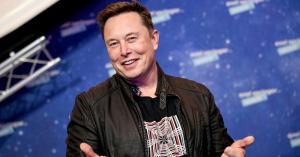On Tuesday, SpaceX successfully launched its Falcon Heavy rocket for the first time. It was a momentous step forward in the field of space travel, and it left many people wondering when this privately funded company, founded by eccentric billionaire Elon Musk, became a power player in the cutting edge of scientific advancement.
The answer is surprisingly tricky to summarize. SpaceX has had a zig-zagging trajectory into success. At times, the company is able to unveil new projects and new plans that inspire optimism and excitement in investors and casual viewers alike.
Videos by PopCulture.com
Other times, the companies endeavors have suffered catastrophic accidents. SpaceX has had explosions, setbacks, miscalculations and every manner of issue that can affect such a risky enterprise. At times, other aerospace professionals have written the company off as a short-lived passion project for a man who grew up reading sci-fi but knows little about actual rocket science.
The answer undoubtedly lies somewhere between those extremes, but right now it’s hard to pinpoint. SpaceX is hotly debated, here’s a few reasons why.
2/6/2018 Falcon Heavy Launch
SpaceX swings in and out of the headlines only when the company has a massive success or a massive failure. On Tuesday, it pulled off a launch nearly ten years in the making, sending its Falcon Heavy rocket into orbit.
This is the most powerful rocket ever sent into space by a privately funded organization.
“It seems surreal to me,” Elon Musk said in a press conference afterwards. He told reporters that the success had given him a lot of hope that they could successfully build a newer, bigger generation of rockets, which he calls of the B.F.R. — Big F–ing Rocket. Those would be instrumental in Musk’s ultimate goal, which is sending a colony to Mars.
It’s not all work and no play for Musk, however. The billionaire entrepreneur included a personal sentiment in the rocket’s payload. His personal Tesla Roadster was sent into space, with a mannequin wearing a space suit strapped to the driver seat. The car is livestreaming as it drifts away from the earth. It’s expected to orbit the sun for a million years.
“It’s kind of silly and fun,” he said, “but silly and fun things are important.”
Who Is Elon Musk
Live view of Starman https://t.co/gvSlztlE6l
— Elon Musk (@elonmusk) February 6, 2018
Musk was born in South Africa in 1971. His mother is a Canadian model and dietician, and his father is a South African electrical engineer, sailor and pilot. His parents split when he was young, and he stayed with his father in Africa until he turned 17. He moved to Canada, then shortly transferred to the University of Pennsylvania.
Musk graduated with two bachelor’s degrees — one in physics, and one in business. He was also reportedly fixated on computers from a young age, and had a serious interest in the writing of Isaac Asimov.
After college, Musk moved to California to pursue a PhD, but left after two days in favor of his entrepeneurial pursuits. He became an American citizen in 2002.
In addition to SpaceX, Musk founded Tesla Inc, which manufactures electric cars, SolarCity, and many other companies. His first big financial success came from a company he’d founded called X.com, which merged with another to become PayPal.
In 2016, Musk was listed as one of the richest people in the world by Forbes, who estimated his net worth at $20.9 billion.
All of Musk’s endeavors seem to revolve around advancing human civilization and preventing its extinction.
SpaceX Founding
Musk conceived of a “Mars Oasis” as early as 2001. He wanted to use his wealth to reignite public interest in space travel and hopefully get Nasa’s budget increased. To do this, he traveled to Russia in hopes of buying cheap old rockets, but found nothing within his budget.
On his flight home, Musk reportedly calculated the cost of raw materials and labor to build his own rockets at a tiny fraction of the cost. He began assembling a team in the U.S. and founded Space Exploration Technologies Corp., or SpaceX in 2002.
The company was intended to lower the price of space travel by building the hardware in house for a lower cost. Ultimately, Musk wanted to get a colony on Mars. In 2011, he made a public statement saying that he believed the company could land people on Marks within 10-20 years, though that figure is a moving target.
SpaceX Achievements
Since its founding, SpaceX has grown to employ almost 6,000 people. The company has met or surpassed a number of important benchmarks in space travel, including the launch of the first privately funded liquid-fueled rocket in 2008. They were the first privately funded company to do many things in the aerospace world, but in 2015 they began to overshadow even longstanding government programs like Nasa.
The company was the first to land and reuse an orbital rocket, and accord to Wired, they plan to use recycled rockets for about half of their missions this year.
SpaceX has a number of contracts with Nasa, who hired the company to deliver payloads to the International Space Station. They also put satellites into orbit and work with both private and public enterprises.
SpaceX Failures
The fledgling space program is not without hiccups, however. In June 2015, one of SpaceX’s Dragon spacecraft took off on its Falcon 9 rocket for a resupply mission to the International Space Station. The acceleration knocked loose a 2-foot long strut purchased from an outside supplier, which released pressurized helium and led to an explosion.
The capsule, frustratingly, survived the explosion but was destroyed on impact when it landed on the ground. Experts determined that the capsule could have been salvaged if it had had software to deploy its parachute installed. The company was mocked for this oversight.
In 2016, a Falcon 9 rocket exploded during a pre-flight fueling operation. The explosion destroyed a $200 million satellite, which was to be the payload. Musk called it “the most difficult and complex failure” of the company. SpaceX didn’t launch anything for four months after the incident.
Mars Aspirations
The company’s ultimate goal, and the part romanticized by non-scientist onlookers, is the Mars colony of Musk’s dreams.
The eccentric billionaire has explained the colony as a way to prevent human extinction in the event that the Earth can’t recover from climate change, or is somehow otherwise compromised.
In 2011, Musk predicted that humans would land on Mars within 10-20 years. In 2016, he revealed SpaceX’s plans for an Interplanetary Transport System, which he referred to as a “Mars Colonial Transport” in 2013.
Experts often mock Musk’s projected timeline for colonization of Mars. It’s pointed out that, while Musk has a bachelor’s degree in physics, he has no formal training in rocketry. There’s also little information about how a human being would fair in a Martian atmosphere long term — with different air content, different gavity, and different levels of solar radiation.
Other Milestones
In 2017, SpaceX was contracted by two private individuals who want to orbit the moon in a Dragon spacecraft and return to Earth. The mission is planned for some time in late 2018, and if it is achieved, it will be the first recorded instance of “lunar tourism.” Musk says the flight will cost about $70 million per person.
The company has also revolutionized reusable launch systems, where previously rockets were completely destroyed after one use.
In 2016, Nasa agreed to help SpaceX launch its first mission to Mars in 2018. The agency will lend its communications hardware already on the red planet at the landing site, and some Nasa engineers will contribute to the SpaceX craft. The mission is significant, as the Earth and Mars are at their closest distance once every 26 months.
Competitors
While it may seem like an open playing field, SpaceX is not alone in the space travel business. Of course, Nasa has launched dozens of missions in the past five decades or more, and the Russian space program rivals it at times.
In addition, SpaceX shares their cargo run contract to the International Space Station with a company called Orbital Sciences. Boeing has reportedly built a rocket called the CST-100, which rivals SpaceX’s Dragon, and Musk’s company is in a constant battle to hold onto its defense contracts.
Believe it or not, the growing market for recreational space flights is also growing, and SpaceX competes there with Virgin Galactic, which is owned by Richard Branson.
Elon Musk’s Other Ventures
If launching a Mars colony within the next ten years sounds far-fetched, you won’t believe the other plans Musk is juggling at the same time. The billionaire founded The Boring Company, which made headlines in January when it launched a line of retail flamethrowers.
The company’s real goal is to “bore” into the earth, creating a labyrinth of ultra-efficient tunnels beneath major cities, where an electric “Loop” transportation system could be installed. Engineers believe this would reduce emissions, travel time, and accidents, as well as saving space on the surface for more development. There is an additional plan in place for underground “Hyperloops,” which could hypothetically travel from New York to Washington D.C. in 30 minutes.
Musk is also the chairman of OpenAI, a company which hopes to guide the responsible development of AI which won’t destroy humanity. He is the CEO of Neuralink, which is reportedly developing implantable brain-computer interfaces, or BCIs.
And, of course, Musk created the chic and efficient electric car company Tesla, Inc. The eccentric billionaire is like a comic book character, and while many think of him as an altruistic Batman, others are waiting to discover that he was a sinister James Bond villain all along.





